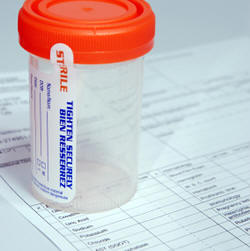 |
|
|
|
|
|
|||
|
By Mike Mitchell |
||||
 |
March 4, 2010 -
United States Court of Appeals in the
Dr. Fred
Pasternack was a part-time pilot with Northeastern Aviation.
Northeastern Aviation has a drug policy that requires random drug check
on all personnel. In June 2007, Northeastern Aviation notified
Pasternack that he had been randomly selected for drug testing.
Pasternack
reported to the company’s drug testing facility, LabCorp collection site
to give a urine sample. However, Pasternack was unable to provide a
sufficient quantity of urine for the test. He was informed he would need
to remain at the collection site until he could produce enough urine to
perform the test.
|
|||
|
Pasternack
informed the lab technician, Theresa Montalvo, that he was unable to
stay due to committed appointments that he had made. He left but
returned back to LabCorp within two hours to complete the urine
test. LabCorp provided the employer with a copy of the results which
indicated Pasternack passed the drug test and had left the drug
testing facility and returned two hours later to complete the exam.
The employer reported this to the FAA.
The FAA,
initiated an investigation and concluded that because Pasternack
left LabCorp collection site, the FAA viewed this act as a refusal
to take a mandatory drug test resulting in the FAA revoking
Pasternack’s airline transport pilot and flight instructor
certificate and his ground instructor certificate.
Pasternack
appealed his case before the NTSB board. The Board reviewed the
case, heard arguments and concluded in favor of the FAA. The Board
observed that Pasternack’s undisputed conduct the fact he had “left
the test site without providing an adequate urine sample and before
the testing process had been completed” – qualified as a refusal
under the plain language of § 40.191(a)(2).
|
||||
|
What Is A
Refusal To Take A DOT Drug Test (In Brief)
40.191 - (a) As an
employee, you have refused to take a drug test if you: (1) Fail to
appear for any test within a reasonable time, as determined by the
employer, after being directed to do so by the employer. This includes
the failure of an employee to appear for a test when called. (2) Fail to
remain at the testing site until the testing process is complete;
Provided, That an employee who leaves the testing site before the
testing process commences for a pre-employment test is not deemed to
have refused to test; (3) Fail to provide a urine specimen for any drug
test required by this part or DOT agency regulations; Provided, That an
employee who does not provide a urine specimen because he or she has
left the testing site before the testing process commences for a
pre-employment test is not deemed to have refused to test;
(c) As an
employee, if you refuse to take a drug test, you incur the consequences
specified under DOT agency regulations for a violation of those DOT
agency regulations.
(d) As a collector
or an MRO, when an employee refuses to participate in the part of the
testing process in which you are involved, you must terminate the
portion of the testing process in which you are involved, document the
refusal on the CCF (including, in the case of the collector, printing
the employee's name on Copy 2 of the CCF), immediately notify the DER by
any means (e.g., telephone or secure fax machine) that ensures that the
refusal notification is immediately received. As a referral physician
(e.g., physician evaluating a shy bladder condition or a claim of a
legitimate medical explanation in a validity testing situation), you
must notify the MRO, who in turn will notify the DER.
(1) As the
collector, you must note the refusal in the Remarks line (Step 2), and
sign and date the CCF.
Pasternack filed
an appeal with United States Court of Appeals in the
Pasternack argued
that he did not refuse to take the exam, he was not informed that if he
left the testing site it would be considered a refusal to take the exam.
The lab technician indicated that she did not believe Pasternack’s
departure as a refusal to take the test.
The FAA and the
NTSB argued the Pasternack had been trained as a medical review officer.
Pasternack, “should have been familiar with the requirement that an
employee may not leave the collection site during a random drug test.”
The court of
appeals three member judges on February 26, 2010 remanded the case for
further proceedings consistent with the courts opinion. |
| ©AvStop
Online Magazine
Contact
Us
Return To News
|
|
